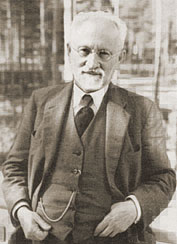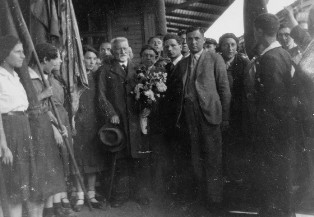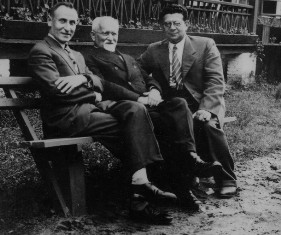Simon Dubnow 
Simon Dubnow |
Simon Dubnow was born in Mstislavl, Belorussia in 1860. He was one of the great Jewish historians and thinkers of modern times and one of the founders of Autonomism, the movement that advocated Jewish national autonomy in the Disapora. Dubnow received a traditional Jewish education, and acquired a broad general education on his own, he was close to the circle of the Jewish Enlightenment in Russia. Dubnow’s first works on Jewish history were published in the 1880’s. Dubnow first wrote several studies of the life of the Jews in Russia and Poland. His main work was a complete history of the Jewish people which was first published in German in ten volumes and later in Russian and Hebrew. These volumes are considered so important that all students of Jewish history have had to read and understand them since they were published until today. However, Simon Dubnow did more than just record the facts of the past. He was most concerned with the life of his people in the future. His greatest achievement was his pioneering approach to the study of the history of the Jews in eastern Europe and their spiritual and religious movements. In his research work Dubnow stressed the periods of Jewish autonomy in Poland and Lithuania, plus the history of Hasidism. His major work was the ten-volume Weltgeschichte des Judischen Volkes (World History of the Jewish People), which traced the history of the Jews from their beginnings to modern times. It was first published in its German translation between 1923 and 1929, and then in other languages, including the original Russian. In his early work as a historian Dubnow followed the trail of the nineteenth- century German Jewish historian Heinrich Graetz, but he later discarded the view that saw the Jewish people as a unique phenomenon in history with its own spiritual and religious mission. He adopted instead a secular concept, which regarded the Jews as a national entity that, despite the passage of generations and the rise and fall of its “centres of hegemony,” has preserved its autonomous spiritual framework. In Dubnow’s view, it was the spiritual and cultural elements that represented the highest degree of a people’s development. This was the source of Dubnow’s political philosophy, which regarded the Emancipation as a turning point in Jewish history and called for the granting of spiritual and cultural autonomy to the Jewish populations of Europe. Dubnow regarded such a grant of autonomy as providing the basis for national Jewish existence and for the realisation of Jewish strivings, especially in the countries of eastern Europe. This political concept was the ideological base upon which Dubnow and his associates established the Jewish People’s Party (Volkspartei) in 1906. In 1922 Dubnow succeeded in leaving the Soviet Union and settled in Berlin, when Hitler came to power, Dubnow moved to Riga, the capital of Latvia, and continued his work. When Riga was occupied by the Germans in early July 1941, the eighty-one year old scholar was put in the city’s ghetto, and his library was confiscated. In his final days he reportedly told the people he met: "Yidn, shreibt un fershreibt" “Jews, write and Record" On December 8, 1941, Simon Dubnow was among thousands of Riga ghetto Jews rounded up to be sent into the Rumbula forest to be massacred. According to one account, Dubnow was sick and feverish when he was shot to death while being taken out of the ghetto in December 1941, by a Latvian guard, or by another account he was shot by a Gestapo officer who had formerly one of his pupils, in the ghetto and buried in a mass grave.
Sources: The Holocaust by Martin Gilbert, published by Collins, London 1986. Encyclopedia of the Holocaust - Israel Gutman (Ed) - New York 1990. GFH Copyright: SJ & Chris Webb H.E.A.R.T 2008 | 

